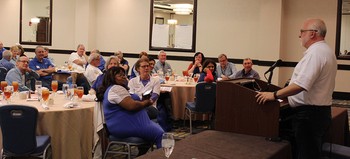More than 100 members of the Presbyterian Disaster Assistance National Response Team came from across the country and gathered in a St. Louis hotel conference room in a sea of blue; kicking off their annual meeting with a celebration and cake.
Twenty years ago, a handful of dedicated Presbyterian leaders began what was then known as the Presbyterian Disaster Assistance Team or PDAT. The Rev. Alonza Washington was among the members of the original team. He says it’s rewarding to see how PDA has grown into a ministry of presence.
“When we got started, it was a response to hurricanes only. Now the vast need of volunteers has grown and PDA and the National Response Team has responded to the call. It’s not if a disaster will happen, but when,” said Washington. “We cover the whole spectrum and continue to provide this ministry like no one else can.”
The National Response Team consists of 96 members with an additional group of volunteers. In times of natural or human caused disasters, team members are deployed to areas of need to meet with presbyteries and churches, view damage or impact, and make final reports and recommendations to PDA for future assistance. The teams also lead trainings including compassion fatigue training for pastors and care providers.
It takes more than desire to be a part of this group according to PDA officials. Prospective members must go through training, in depth questioning and evaluation to determine how they interact with people both on the team and those dealing with disaster.

PDA Associate for Domestic Disaster Response, Rick Turner, addresses the NRT annual meeting in St. Louis. —Rick Jones
Rick Turner, associate for domestic disaster response with PDA, says the team will spend four days in training, worship and fellowship.
“Training is important because we may go to areas that are not always safe. You have to be prepared and trained because teams will interact with people who have been severely impacted by the loss of property and/or loved ones. We are Christians so we spend time together in worship as well,” he said. “The fellowship is important because you get to meet and talk to people here that you may be deployed with for two weeks, stuck in some place where you sleep on church floors or drive for a couple of hours together. The fellowship time gives them a chance to meet and get to know each other.”
The meeting agenda includes the commissioning of new NRT members as well as ethics training and other programs related to disaster preparedness.
“What I have seen is the flexibility of the team,” said Susan Mattocks, NRT member. “In the five years that I’ve been a member, changes have been made to make us adaptable and relevant to not only what is happening now but our best guesses for the future and that is very encouraging.”
The annual meeting continues through Monday, April 11.

_medium350.jpg)